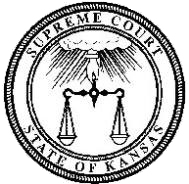Kansas supremes strike down law on chief judge appointments; is court funding in danger?

The Kansas Supreme Court on Wednesday struck down a section of state law that took away the court’s authority to appoint chief judges in the state’s 31 judicial districts in a case that could threaten court funding.
The court said the section violates a provision of the state constitution giving the state supreme court general administrative authority over the state’s courts, report the Kansas City Star, the Topeka Capital-Journal and the Lawrence Journal-World. The law had switched power to appoint the chief judges from the state supreme court to the judges in each district.
The court also found a violation of the separation of powers doctrine.
The decision (PDF) “may bring the state closer to a crisis over court funding,” according to the Capital-Journal. A nonseverability clause in the 2014 law says a decision striking down any provision of the law would invalidate the entire law, including, apparently, provisions for state funding of the judiciary.
A judicial funding law for 2016 and 2017 passed this year also contained a nonseverability provision that applies if any portion of the new law is struck down—and if any portion of the 2014 law is struck down, according to this lawsuit (PDF) filed by the Brennan Center for Justice.
Enforcement of the nonseverability clause is on hold until March 15, allowing for lawmakers to address it when they return for the 2016 legislative session, according to the Lawrence Journal-World.
The Kansas Supreme Court addressed the issue briefly in its decision Wednesday. A lower court had noted the nonseverability clause in its ruling in the case, and had struck down the legislation in its entirety.
“Neither party has challenged the validity of that portion of the district court ruling,” the state supreme court said, “and we accordingly do not address it here. We note only that our holding appears to have practical adverse consequences to the judiciary budget, which the legislature may wish to address, even though those concerns played no part in our analysis.”



